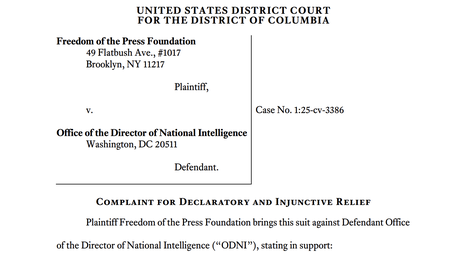Three new FPF FOIA suits target threats to transparency, press freedom


AP Illustration
The Freedom of Information Act gives the public a right to access government records.
The Freedom of Information Act is supposed to shed light on government activity by giving journalists and the public access to government records. But the law is in shambles. From endless delays in response time and unjustified refusals to ridiculously overbroad redactions, FOIA is plagued with problems.
We must fight back against the government’s refusal to comply with FOIA and urge Congress to reform the law and end backlogs of requests, reduce the number of exemptions, and overturn damaging court decisions.

FOIA retaliation coincides with threats to the press

ICE isn’t the secret police, and it shouldn’t be allowed to operate a de facto secret prison

Plus: Claims Paramount settlement money will go towards a library deserve heavy scrutiny

FPF FOIA request seeks more information

Plus: Don’t miss FPF’s upcoming virtual FOIA event

Plus: Gabbard wants the intelligence community to embrace AI. Will that be good for declassification?

Freedom of Information Act lawsuit seeks documents on targeting of journalist

Plus: Justice Department lets former White House officials accused of stealing presidential records keep them.

Plus: The Food and Drug Administration is still hiding deadly E. coli outbreak information

Podcast appearance highlights National Archives crisis and how Trump’s efforts to rewrite history will make it harder for policymakers to be effective
Something went wrong and your email updates subscription could not be processed. Please visit our signup page and try again.
Thanks for helping us protect FOIA and the right of the press and public to know what the government is up to.
Share this message on social media: